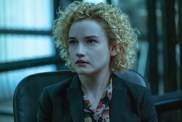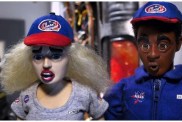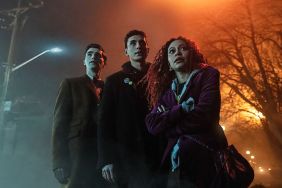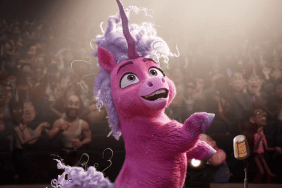If you lived in New York City during the early ’90s, tunes like “Can I Kick It?” “Check the Rhime” “Buggin’ Out” and “Scenario” would probably get regular play on your boom box – these were the days before the invention of the iPod after all. Those were just a few of the songs of A Tribe Called Quest: Q-Tip, Phife Dawg, Ali Shaheed Muhammad and Jarobi White. At the forefront of an ever-evolving hip-hop scene and part of a collective that became known as “Native Tongues,” these four musician/rappers played a part in smoothing out the toughness of precursors like Run-DMC and L.L. Cool J to create something mellower and more influenced by jazz and soul. In doing so, they refined the sound of hip-hop with three back-to-back albums that are still considered classics: their debut “People’s Instinctive Travels and the Paths of Rhythm,” its follow up “The Low-End Theory” and then “Midnight Marauders.”
Nearly thirteen years after their last studio album and three years after their temporary 2008 reunion for the “Rock the Bells” tour, the relatively short-lived career of the Tribe has been documented in the film Beats, Rhymes & Life: The Travels of a Tribe Called Quest, directed by Michael Rapaport, an actor known for roles on television shows like “Boston Public” and “Prison Break” and movies like Cop Land and Beautiful Girls. As the film’s title so readily explains, the movie covers the early days of the group meeting up in church and school and how their musical relationship evolved over the course of their ten years as a recording act. It’s surprising how open the guys in the group are about the notoriously tense dynamics between frontmen Q-Tip and Phife, something we see explode on the 2008 tour, and it also includes testimonials from dozens of artists who worked with the Tribe or were directly influenced by them.
It’s one of the best docs of the year, but it’s also one without its controversy as in the months before and after its debut at the Sundance Film Festival, various members of the group spoke out about some of the content in the movie as well as not getting producer credit and potentially not profiting if the film is successful.
ComingSoon.net sat down with Michael Rapaport to talk about his directorial debut when the movie premiered at the Tribeca Film Festival back in May. After a few minutes, we were joined by Phife Dawg aka Malik Taylor, the “Five Foot Assassin,” one fourth of the highly influential hip-hop group and the only one doing interviews in support of the film.
ComingSoon.net: I understand you were already a fan of the band. At what point did you decide to do something and how did you approach them and try to convince them to do it with you?
Michael Rapaport: Getting the film started was probably the easiest thing. I’ve known Q-Tip for like 15 years, and I’ve been a fan of the group. I started in jest saying that somebody should do a documentary about A Tribe Called Quest in 1998 at their last show. Every time I would see them, I would make comments about when are they going to do music? “Somebody should do something on you guys,” and then in 2006, they did a show at the Wiltern Theater, and that was great, and that’s when I first started talking to them about doing the documentary.
CS: Did it start with you following them around on that reunion tour?
Rapaport: Yeah, yeah, yeah. It was planned as that and it started as that in 2008. Yeah, they went back on tour. They were headlining the “Rock the Bells” tour and it started as that. I didn’t really have a laid-out plan as to what I wanted to do, but I had an idea what I wanted to do. Fortunately, I was given the access to tell a story that was beyond just how they did it or sort of too “Tribecentric.”
CS: Obviously, you’re a fan and knew a lot about them already.
Rapaport: I didn’t know anything about their personal relationships. I knew nothing about it ’cause I was just a fan, and my relationship as a friend was not like a long, deep… we’d have dinner every now and then, but I didn’t know anything about the group dynamic at all.
CS: You didn’t really know them while they were still together in the ’90s?
Rapaport: Exactly.
CS: Besides filming the tour, how did you go about finding people who knew the group to talk about the group. Did they help you get in touch with some of those people?
Rapaport: No, I reached out to people that I knew like Pharrell and Emir and Tariq from the Roots, then one person would give me another person’s number and I’d reach out to them, and then it just snowballed. People were just really excited and open to talking to me about A Tribe Called Quest in that time in hip-hop.
CS: You’ve directed some television before but never a documentary, so did you have any idea what a big process it is and how much footage you need to put a doc together?
Rapaport: I didn’t realize how big of a process it was going to be. I thought it was going to be a lot simpler. I knew it was going to be challenging, but I just didn’t realize the amount of work and the overhaul it was going to take to finish the movie and to make it something that was worthwhile, which was my biggest fear, which was not making it worthwhile.
CS: Are you a fan of documentaries yourself and did you have any kind of model for how you wanted to structure this?
Rapaport: Yeah, yeah, yeah, there definitely was a few. I definitely referenced “Gimme Shelter,” the way we shot some of the concert footage. I watch so many different documentaries. There was a documentary “Straight No Chaser” that there was a lot of vérité stuff of Thelonious Monk walking around the streets that I liked. I love the chapters in “Dave Chappelle Block Party,” I love the Maysles Brothers. There’s so many different things I watched and just got inspired by, and it just made me feel like I wasn’t totally crazy in what I was trying to do.
CS: As you started doing interviews, what was the most surprising thing you learned about the group?
Rapaport: Well, I didn’t realize that Q-Tip and Phife had known each other since they were that young. I didn’t know their relationship was that old and how close they were before music came into their lives. That was a surprise, and obviously Phife’s health stuff. He was so open about that stuff. I knew a little bit about it but I didn’t know the severity of it and I had no idea that he was even going to mention it. That was important and as a director, a pleasant surprise.

CS: Did you know that the reunion tour was put together to help him with his medical bills?
Rapaport: I didn’t know about that. I didn’t realize that he was struggling as much as he was with his health when I first started shooting in 2008. I was unaware of the details.
CS: How much time did you spend with each of the members of the group? Did you end up going back a few times to talk to them?
Rapaport: Oh, yeah. I shot, edited, shot, edited, shot, edited. It went on and on and on. We finished shooting in December of 2010, so we weren’t done until we knew we were done, so we’d shoot and f*ck around, shoot and take a break. Then when we started getting closer to having the movie to present for Sundance, we started zeroing in on a first rough cut, which I think was submitted in August of 2010.
At this point, Phife walks up and greetings are made all around, including Phife’s attorney Greg, literally the only lawyer we’ve ever met who wears a T-shirt.
CS: We were just talking about the technical aspects of putting together the movie and getting ready for Sundance.
Rapaport: Yeah, submitted it in August, and then got accepted to the film festival sometime in October, and then knew that the end was near, which I’m glad. Thank God!
CS: Has it changed since Sundance?
Rapaport: No, I’m just glad we got into Sundance, because then we realized we had to finish this movie because it was killing me. I had to be done, so I was like, “That’s it. We gotta finish this movie.”
CS: What were some of your concerns when he contacted you, which I assume was before the reunion tour?
Phife: Actually, we were in the middle of the tour already. The tour was already almost over. We only had maybe five dates late, something like that, when he approached me about it at least. My main concern was (to Michael) what did I say to you? “How real could I get?”
Rapaport: You said, “How real?” and I was like, “Dude, as real as you want.”
Phife: Yeah, because there’s a lot of misconceptions and things of that nature, and if we’re doing a documentary, I already knew that I wanted to keep it as real as possible, but a lot of people in the group don’t always see it that way, you know what I’m sayin’? I just knew from the jump street I was going to do Phife at the end of the day.
CS: You guys were basically on tour and Michael already knew Tip so did he introduce you guys or did you already know each other beforehand?
Rapaport: In passing a little bit.
Phife: Yeah, in passing. I knew his work. He obviously knew our work. I really met him at a Knicks game that I went to with Q-Tip as a matter of fact. He just happened to be in the executive jump-off upstairs and started quoting lyrics and that’s when I knew he was an official fan like that, because I really didn’t know how much of a fan he was until that night. Then once he approached me about this, and the more he kept shooting and we were getting together about the movie, then we got mad-cool like that.
Rapaport: You know, I remember that night when I saw you at the Knicks game, I was like, “You guys are together, you gotta make more music!” I gotta find that picture because I have a picture of you guys.
Phife: Yeah, me and Q-Tip is cool outside of the business, but you know, within the business sometimes it can get ugly, you know what I mean?
CS: You’ve also known each other for such a long time…
Phife: We’ve known each other since we were like 2 years old.
CS: As this movie has been getting around and I’ve talked to people, it’s amazing how many “Tribe” fans are coming out of the woodwork. When I was listening to the records back when they came out, I didn’t have many friends who knew your music. Have you noticed that the group’s fanbase has continued to expand since 1998 despite not releasing any new music?
Phife: Fanbase-wise? Yeah, it’s amazing because we haven’t done a studio album in thirteen years and people treat us like we have the latest hot single out or we dropped a classic album back in 2010 or something, so my whole thing is that soon they’re not going to care, but because he did this movie, they’re going to care even more now. It’s crazy, it’s a crazy dynamic.
CS: I asked Michael earlier about how much time he spent doing interviews, so how much time did you end up spending with each other trying to keep it real? Did you always have more stuff you wanted to say that got into the movie?
Phife: I don’t know. I just let it out ’cause I already knew he was on time constraints as far as how much stuff he could put in there and certain things had to be taken out. There’s a couple things I wish he was able to leave in there, but I can’t complain. The movie came out hot.
CS: I would think that over the years, a lot of people would have come to you to do a “Tribe” doc, so what was it about Michael that made you think, “This is the guy to do it” especially since he hasn’t directed other docs, which is surprising after seeing the movie.
Phife: I don’t even know how to answer that question ’cause there were a couple times people came to us about that, and back then, I was just automatically like, “Naw, I ain’t with it. Nope. Mm-mm” then with him coming, initially I was like, “Naw,” because I already knew I had health issues, and I really didn’t want to talk about that, but once everybody already agreed, it was like, “Who am I to say ‘No’?” number 1, number 2, then meeting him at the Knicks game and my impression of him as far as him being a fan, I was like, “Alright, cool. Let’s do it.”

CS: What I really like about the movie is that it really gets into Ali and Jarobi’s involvement in the group and what they bring. They both have interesting stories because Ali is always in the middle of you and Tip, and Jarobi left really at the beginning as the group was breaking.
Phife: Yeah, they’re both like referees, when we’re not seeing eye to eye or what have you. I mean, you have four different personalities, you’re gonna have four different situations, that’s what it is, but I think the most combustible is Q-Tip vs. Phife or Phife vs. Q-Tip, whatever. If that’s not coming together correctly, it’s like when you make that one mistake during a division problem, the whole thing comes apart and you gotta start from scratch. You can’t, “Well maybe if I make this shortcut.” Nah. You already messed up the division problem. They’re always in between and honestly, I’m not the one that put them in between. I hate the fact that they’re in between like that. My whole M.O. is “I made my bed, now let me lie in it. I can do bad myself, so let me handle this.” I never want them to take the bulk of that weight.
CS: I think one of the interesting things covered in the movie is why Jarobi left…
Phife: Jarobi, his first love was culinary arts, and basically, like he said in the movie, he had a strict upbringing, but at the end of the day, it was his decision, not anybody else’s, because he loved cooking so much, so that’s what he went to do. He had verses on certain records and everything, but he left to do culinary arts, that’s basically what it is.
Rapaport: You asked me earlier about something I learned about. Jarobi’s leaving the group, and Jarobi’s importance to the group, their relationship, I forgot (but) that was definitely a big thing. What he means to them as a friend. And as a fan, I used to tease Jarobi when I first started interviewing him, “Yo, you’d hear crazy rumors, ‘That dude Jarobi is in a mental hospital, that dude Jarobi got locked up, that dude Jarobi’s on crack.'” It was a thing in hip-hop, it’s like, “What’s up with Jarobi?” because he was so present on the first record. Jarobi was very, very open and sensitive and humble and vulnerable during the shooting, and I had no idea. That’s just like as a filmmaker when you go, “Oh, sh*t.” He’s just a sweet dude, he really is.
CS: I thought it was great that you were able to get him back on the 2008 tour.
Phife: Well, he left right before “Low End Theory” came out, and then he came back on tour when we were about to break up. We talk all the time, but he called me one day in Atlanta, and I was like, “What up, kid?” and he was like, “Yo, I’m coming on the road.” I’m like, “When?” He’s like, “On this trip,” and I’m like, “For real?” He said, “Tip called me and asked me to come back, so something ain’t right.” He came back on the last leg and then when I was doing my solo project, he used to come out on the road with me. 2008, that was nothing but he mainly came out in 2008, because I was sick and I really needed him to back me up on certain things, just in case I couldn’t move forward. I was able to move forward, but he really saved my day, you know what I’m sayin’?
CS: Phife, you’ve been the most supportive of this movie, being that you’re here talking about it. But in the movie, you’re also the one keeping it real, so there’s a lot of stuff that doesn’t necessarily make you look good like when you’re blowing up on the tour. Was there anything in the movie that you thought may have been too real?
Phife: Nah, nah. I remember that one part where he showed the little skirmish, whatever? It’s funny, because when we were in the part when my heart was racing? I didn’t even see Mike sitting in the corner. He was sitting in the corner with the camera like this. I’m venting all whatever whatever and then I turn to my right, I’m like, “Mike, what are you doing?”
Rapaport: It was in the other cut. You see him looking at me and looking at the camera, I remember this.
Phife: I was like, “Yo, Mike, you caught all of this?” He was like, “Oh, absolutely” and we just busted out laughing. I was like, “This guy’s crazy right here with his camera,” ’cause I did not see him in the corner. I was so angry at that moment that I didn’t see him.
Rapaport: You know, I was only told to turn off the camera one time by any of the guys, once, and then I actually turned the camera back on. To all their credit, they were all very, very open. Later on, you start to have thoughts and opinions, but the thing about Tribe Called Quest’s music that people related to (was) the honesty, the vulnerability in the music, and that comes across in the movie. Their music was really honest, and that’s why people responded to it. Also, the thing about their dynamic, when they butt heads. The Q-Tip/Phife relationship, the Q-Tip/Phife dynamice as MCs, it’s like synonymous with hip-hop, their voices, their styles, their heights, the way they look. It was like a perfect couple. I’m just talking about the two of them, and what makes them interesting MCs and their charisma as individuals, which is totally different, also makes them interesting as…
At that very moment, Mos Def, one of the MCs influenced by the Tribe (who appears briefly in the film, having been a part of that same “Rock the Bells” tour) walks up and greets Mike and Phife, having seen them from outside as he was catching a cab. Mike goes off to quickly introduce Mos Def to his kids, so we continued talking to Phife.
CS: When did you see the movie for the first time? Did you wait until Sundance?
Phife: No, I didn’t wait until Sundance. I saw a couple of different cuts in August or September, because his partner came to my crib or that area during football season and showed me the movie. I saw the first two cuts. I’ve seen the movie at least 8 times now, maybe more.
Rapaport: And he saw it in rough form.
CS: I was curious when you had something that you felt was ready to show them and how did you approach them about that?
Rapaport: (returning) You know, after the tour I had something. After the tour and the first few interviews with them and some key people – I got Money Love really quickly and Mike G from the Jungle Brothers soon after the tour. Those were some of the first people and it was all old stuff. I had something, and the assistant editor, he did that, and I was crying watching it ’cause I was like, “Holy sh*t, I’ve got a movie!” And it was just like eight minutes, but I was like, “Holy sh*t!” I’ll never forget that and I’ll always be in debt to this guy Eric. He just did it on his own. He was compiling all this footage and he just put together this stuff, it’s rough, but I knew that we had the bones of a movie.

CS: It’s great that you waited to finish it until 2010, because it gave you this great epilogue. You could have finished the movie a year earlier and not had that.
Rapaport: We could’ve, we could’ve. You know, they went back on tour in the summer of 2010, and I was like, “F*ck.” I actually didn’t even know it was happening. I was like, “I can’t do it, I can’t do it.” We had another ending and it wasn’t as good, and luckily, they went back on tour, because we got to stay with them during rehearsal and got some footage that I’d like to some day release as a short film. Because them rehearsing, doing the songs, it was f*cking awesome!
CS: There’s a little bit of the rehearsals in the movie.
Rapaport: A little bit of it, but I got them doing stuff and freestyling, and it was really good. It all worked out the way it was supposed to work out.
CS: As a filmmaker, you need to have your own vision of what this movie should be, but you have these four guys and they each probably have an opinion of what it should be, and you really have to stick to your guns. As a counterpoint, there was another movie at Tribeca about the Kings of Leon and they’re all listed as executive producers and you get the impression they might be very involved in the molding of the material. How tough is it as a first-time filmmaker to stick your guns on what needs to be kept in there or not?
Rapaport: I know that when you’re making a film, it’s not by committee.
CS: Well, it happens by committee a lot, though.
Rapaport: It happens by committee, but at the end of the day, I’ll step away. Everybody had their thoughts, and some thoughts were good. (Phife) was like, “I want to talk about this later,” and we got stuff later. I never dealt with them as a group about the film. At the end, I did. They kind of came together and were like. “We’re cool with this,” but throughout the process, I would deal with them as individuals, and each one of them had opinions and thoughts and some of them were helpful, some of them I didn’t agree with, some of them were good opinions but just didn’t work. The hardest thing about becoming a director on this film was really owning that at the end of the day, I have to make the decisions. I have good people around me, and they’re going to say, “What do you think?” but you have to have the balls and the belief to go, “This is what I want.” I’ve done movies where I was like, “This movie sucks,” and you can blame it on the movie or the editor or the studio, there’s no way around it. That’s why I was so nervous.
CS: The director always gets the blame no matter where the fault really lies.
Rapaport: Yeah, and at Sundance, the first time it screened, the only thing I could equate it to was when my first son was born, because I was…
Phife: I saw him from a distance. I was already sitting in the crowd and my wife and I were like, “Look at him, look at him. He’s taken his hat off, he’s wiping his brow.”
Rapaport: I was freaking out.
Phife: I could tell. I was like, “Yo, he is nerved out.”
Rapaport: I was really nervous, and a couple days before Sundance, I had that moment where I was laying I bed, and I popped up and I said to my girlfriend, “Yo, what if the movie sucks?” She says, “What do you mean?” I go, “What if it f*cking sucks?” No one’s even seen the movie except friends, and then I carried that to the first screening. As soon as the movie started, and people responded, it was cool.
Phife: By the time he walked on stage for the Q n A, you could see the swagger was totally back.
Rapaport: ‘Cause I felt a responsibility to the group and to the fans. They let me do it. If I made a piece of sh*t, I was like, “If this sucks, I’m going to leave the country.” I really felt like I’d be ashamed of myself.
CS: The movie’s great because it adds another layer to the legacy of the Tribe. Phife, where are you at now? Are you working on another solo album? Where do you see the future of the Tribe after this movie comes out?
Phife: Yeah, I have an EP dropping soon, “Songs in the Key of Phife,” the EP. “Eight is Enough” is the title and then the album soon to follow “Songs in the Key of Phife,” the LP, “Cheryl’s Big Son,” so I definitely have some things cooking. I have a sports show that I’m working on. (Mike) called in for it yesterday. It’s called “The Fanalyst,” and also a clothing line. This is one of the caps. Kennel Clothing Company is the name, so I’m getting things rolling, and then of course there’s a documentary about to unfold on July 8.
CS: I was gonna say that when this movie comes out, there’s going to be even more pressure for you guys to get back together.
Phife: Yeah, well we’ll see what happens, but you don’t have to tell me twice. I’m a grown man, I can do bad by myself, but with this poppin’ off, I can also do good by myself as well. No offense to the rest of the gang, but I’m not sitting around waitin’ for nothing or nobody.
Beats, Rhymes & Life: The Travels of a Tribe Called Quest opens in New York and Los Angeles on Friday, July 8 and then will expand to more cities over July and August. You can see the full release schedule on the official site.









